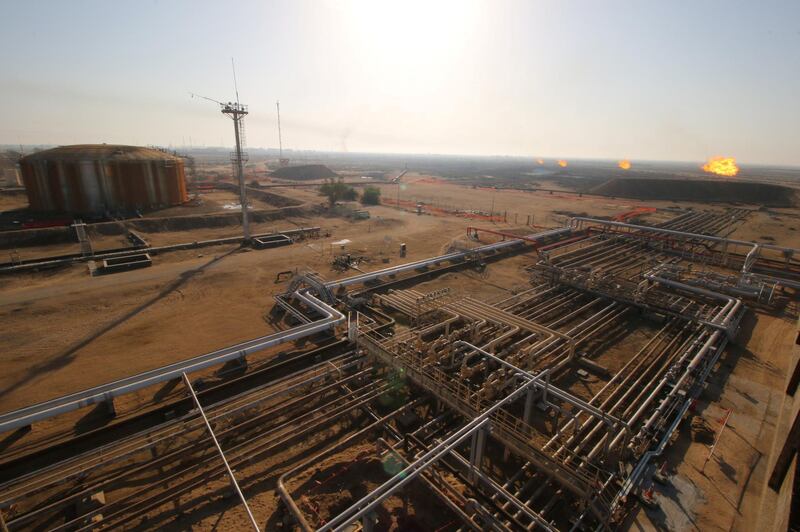Iraq is planning to increase production from the giant Rumaila oilfield to about 1.5 million barrels per day (bpd) in 2018, the head of Rumaila operations said.
Rumaila oilfield, developed by Britain's BP and Chinese partner CNPC, now produces about 1.45 million bpd, said Mohammed Hassan.
The field, which has estimated reserves of about 17 billion barrels, produces the bulk of Iraq’s total output.
"Our plan for 2018 is to boost production by around 50,000 barrels per day after increasing water injections operations and starting new energy installations at Rumaila," said Mr Hassan.
_____________
Read more:
Iraq strains to walk an oil pricing tight rope
Iraq plans new oil pipeline to Turkey
_____________
One of two new 48-inch pipelines used to bring water from a nearby water injection facility will be operational in early 2018, helping raise the amount of water for injection to 1.3 million bpd next year.
BP operates Garmat Ali water facility near Basra which now produces 1.25 million bpd of treated water used for injecting oil wells, Mr Hassan said.
Water injection is core to the development of the southern fields and partly aims to push oil to the surface and overcome falling output from fields such as Rumaila, West Qurna, Zubair and Majnoon.
"We have plans to start work at a new desalinating crude processing facility in early 2018 that will help to improve crude quality," Mr Hassan said.
Mr Hassan said once Rumaila development plan for 2018 was approved by the oil ministry, BP would start drilling about 50 new oil wells to help boost production.
Also, on Wednesday, the country's oil minister said Iraq will announce a tender for a new oil export pipeline from the Kirkuk field within one week.
Last month, Iraq's central government retook control of the field from the semi-autonomous region of Kurdistan. Production of some 300,000 barrels per day (bpd) has been disrupted since then as Baghdad and Erbil argue about export routes.
Kurdistan has built another pipeline for Kirkuk exports to the Turkish Mediterranean port of Ceyhan after the old Kirkuk pipeline belonging to the federal government had been damaged by ISIL militants.
The Iraqi oil minister Jabar Al Luaibi said in Vienna the new pipeline would be able to ship 300,000 bpd. He said current production from Kirkuk of around 80,000 bpd was being shipped by truck to local power stations and refineries.
Luaibi said Iraq was opening dialogue with Russian state oil firm Rosneft, one of the most active investors in Kurdistan.






